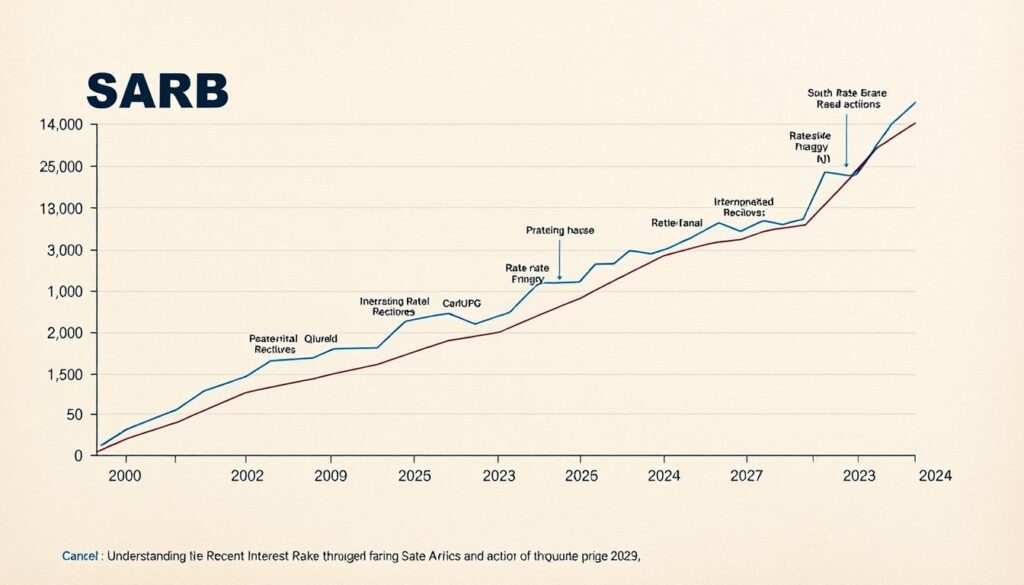On March 30, 2023, the South African Reserve Bank (SARB) raised interest rates by 50 basis points. This move has sparked major conversations about its impact on South Africa’s economy. With rising inflation and ongoing economic struggles post-pandemic, this hike is key for both consumers and companies.
Understanding the Recent Interest Rate Hike
The South African Reserve Bank (SARB) raised interest rates by 50 basis points. This major step took rates higher than before the pandemic. It aims to fight high inflation rates and keep the country’s currency stable. In 2023, tackling inflation is key, especially with the global economy’s ups and downs.
Anúncios
Governor Lesetja Kganyago of SARB talks about why this rate hike is needed now. The world’s economy is shaky, making strong monetary policies more important. These actions help keep the financial system stable. They also protect the money interests of everyday people and investors.

Historical Context of Interest Rates in South Africa
The history of interest rates in South Africa shows big changes due to different economic trends. Back in June 1998, the rates hit a high of 23.99%, showing a tough economic time. But in July 2020, rates dropped to a record low of 3.50% because of the global economy and the COVID-19 outbreak.
Right now, the repo rate is at 7.75%, and the prime lending rate is at 11.25%. These numbers show the challenges we face, like constant inflation and changes in global trade, impacting our economy. Looking at interest rates from the past and today helps people and businesses guess what rates might do next. This helps them make smart choices with their money in South Africa.
Reasons Behind the Interest Rate Hike
The recent interest rate hike in South Africa has several important reasons behind it. The South African Reserve Bank (SARB) saw it as necessary. A big reason for raising rates is to control inflation.
Inflation is growing due to global issues such as increasing oil prices and market uncertainty. Since South Africa is closely linked to the world economy, problems like the conflict in Ukraine affect local inflation.
Also, policy changes in big economies, like the United States, add to these challenges. If the central bank doesn’t act, inflation could get worse. This would impact both consumers and businesses.
The Economic Impact of the Interest Rate Hike
The recent interest rate hike in South Africa has big effects on the economy. It means people and businesses will pay more to borrow money. This could lead to less spending, hitting the markets hard.
Although times seem tough now, the hike could help control inflation in the long run. It’s designed to reduce too much borrowing and spending. However, growth may slow down. Yet, some areas like banking could see benefits from higher interest rates. This change makes people think differently about where to put their money.
The Effect on Consumer Borrowing
The recent hike in interest rates will change how people borrow money. Loans will cost more, making folks think twice about their spending. This change will affect loans and home buying for a long time.
Higher Loan Costs
As interest rates go up, it will cost more to get mortgages, personal loans, and car loans. You might see:
- Increased monthly payments on existing loans.
- Higher interest rates on new consumer loans.
- Tighter criteria to get financing.
This rise in loan costs might stop people from buying homes, leading to fewer sales. It can also change how people feel about the economy. Families will need to look closely at their budgets for bigger financial commitments.
Impact on Home Financing
The increase in borrowing costs affects buying homes. People looking to buy a home might have to lower their expectations due to higher costs. This could lead to:
- Less people applying for mortgages.
- Longer times for buyers to decide.
- More people choosing to rent instead.
Experts suggest reviewing your financial plans with these higher costs in mind. This might lead to changes in how you spend and save money.
Business Reaction to the Interest Rate Hike
The recent rise in interest rates in South Africa has made businesses more cautious. This hike affects their investment choices and the cost of operations. To stay competitive, companies must deal with these changes thoughtfully in today’s tough economy.
Investment Decisions
With rising operational costs, some businesses are thinking twice about investing. They might delay or cut down on new tech, buildings, or hiring plans. This caution comes as future economic conditions stay uncertain, pushing firms to spend less.
Cost of Doing Business
The cost of running a business has gone up across different sectors. This is because borrowing money is now more expensive. Facing higher expenses, companies might need to change their prices. This could lead to less interest from buyers. During this time, industries relying on people’s spending are especially at risk.
Interest Rate Hike and Inflation Control
The South African Reserve Bank (SARB) has raised interest rates to fight high inflation. This action is aimed at tackling the inflation challenges facing the economy.
Raising borrowing costs means people and businesses might spend less. This step is key to keeping prices stable. With higher interest rates, everyone might start to spend more wisely, helping to lower inflation.
It’s important to watch how well this strategy works, given the global economy’s unpredictability. The SARB’s plan highlights the need to keep an eye on economic shifts following these changes.
Global Economic Influences
South Africa’s economy is closely linked with the world’s. Changes in international markets deeply impact local costs and policy. It’s key to grasp how global forces shape our economy.
International Market Conditions
Worldwide clashes and changing trade relationships affect South Africa. These shifts often make us adjust our money policies to keep up. Staying on top of these changes keeps our economy stable.
Comparative Analysis with Other Countries
Looking at South Africa and other advanced countries shows different approaches to interest rates. Countries like the USA also see rate increases due to rising prices. But, South Africa’s unique challenges require special plans. Understanding both local and world economies is crucial for good policies.
Long-Term Projections for South Africa’s Economy
Long-term predictions show South Africa’s economy will slowly get better. It’s expected to grow by about 0.9% by 2025. The economy faces many hurdles that keep growth low. High inflation will affect how much people spend and invest in the future.
Interest rates will mainly be shaped by government actions and the world economy. As economic signs change, managing money policies carefully is very important. If things go as planned, interest rates should start to stabilize.
Advice for Consumers and Investors After the Hike
After the interest rate hike in South Africa, it’s time for everyone to look over their finances. Both consumers and investors need to think about how to handle rising rates. Paying off debts with high interest should be a top priority to ease financial stress.
Looking into loans with fixed rates is crucial now. These loans keep costs stable when rates go up. Checking out savings and investments that give good returns is also smart. Pick ones that do well even when the economy changes.
Investors should be careful where they put their money in uncertain times. Choose sectors known for being strong and stable. Investments in utilities and everyday goods usually stay solid, even when markets are up and down.
Being proactive with financial planning helps deal with the effects of higher interest rates. It prepares you for the challenges ahead.
Conclusion
The recent interest rate hike in South Africa is big news for everyone, from everyday folks to big businesses. It’s mainly to keep inflation in check, but it brings some tough challenges. Now, everyone has to be smart with their money to keep up.
With loans getting pricier and running a business costing more, this interest rate change might slow down growth. People might spend less, and businesses might hold back on new ventures. Yet, by planning wisely, both can overcome these hurdles.
What happens next in South Africa’s economy depends on keeping an eye on inflation and market trends worldwide. By being proactive, people and businesses can lessen the bad effects. Smart planning and choices can help everyone do well, even when finances are shaky.
FAQ
What is the significance of the recent interest rate hike in South Africa?
How has the interest rate changed historically in South Africa?
What are the main reasons for the interest rate hike?
How will the interest rate hike affect consumers and borrowing costs?
What can consumers do in response to the interest rate hike?
How are businesses likely to react to the interest rate hike?
What is the connection between the interest rate hike and inflation control?
What global factors influence South Africa’s interest rates?
What are the long-term economic projections for South Africa following the interest rate hike?
What investment opportunities might arise from the interest rate hike?
Conteúdo criado com auxílio de Inteligência Artificial



